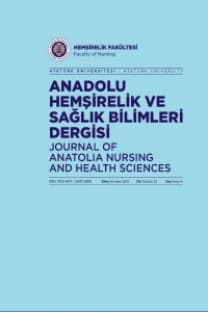UZAKTAN EĞİTİME HEMŞİRELİK EĞİTİMİ PENCERESİNDEN BİR BAKIŞ
Distance education; nursing education,
___
- Alkan C. Açıköğretim: Uzaktan Eğitim Sistemlerinin Karşılaştırmalı Olarak İncelenmesi. 1987; Ankara Üniversitesi Eğitim Bilimleri Fakültesi Yayınları. No:157.
- Aydın CH. Açık ve Uzaktan Öğrenmede Kullanılan Basılı Materyallerdeki Anlatım Biçimine İlişkin Öğrenen Tercihleri. AÜSBD 2005; 5(1): 131-47.
- Bahçecik N, Alpar Ş. Nursing Education In Turkey: From Past To Present. Nurse Educ Today 2009; 29(7): 698-703.
- Dahlgren MA, Castensson R, Dahlgren LO. PBL from the teachers' perspective, Conceptions of the tutor's role within problem based learning. Higher Educ 1998; 36(4): 437-47.
- Diekelman N, Schulte HD. Technology-Based Distance Education And The Absence Of Physical Presence. J Nurs Educ 2000; 39(2): 51-2.
- Ertürk S. Eğitimde Program Geliştirme. 1994; Ankara: Meteksan Matbaacılık. p.112.
- İşman A. Uzaktan Eğitim (8.bs.). 2011; Ankara: Pagem Yayıncılık. p.14-113.
- Gannon FT, Draper PR, Watson R, Proctor S, Norman IJ. Putting Portfolios In Their Place, Nurse Educ Today 2001; 21(7): 534-40.
- Karaağaçlı M. İnternet Teknolojileri Destekli Uzaktan Eğitimde Sosyal Kazanımlar Gereksinimi. IJIT 2008; 1(2): 63-73.
- Kaya Z. Uzaktan Eğitim. (1.bs.). 2002; Ankara: Pagem Yayıncılık. p.30-3.
- Leasure AR, Davis L, Thievon SL. Comparison of Student Outcomes And Preferences In A Traditional Vs. World Wide Web-Based Baccalaureate Nursing Research Course. J Nurs Educ 2000; 39(4): 149-54.
- Lu DF, Lin ZC, Li YJ. Effects of a Web-Based Course on Nursing Skills and Knowledge Learning, J Nurs Educ 2009; 48(2): 70-7.
- Milli Eğitim Bakanlığı. Yaygın Yüksek Öğretim Kurumu, 1982; Ankara: Mesleki ve Teknik Açıköğretim Okulu Matbaası.
- Moore JL, Dickson-Deane C, Galyen K. E- Learning, Online Learning, And Distance Learning Environments: Are They The Same?, Internet and Higher Education 2011; 14(2011): 129-35.
- Soran H, Akkoyunlu, B, Kavak Y. Yaşam Boyu Öğrenme Becerileri Ve Eğiticilerin Eğitimi Programı: Hacettepe Üniversitesi Örneği. HÜEF 2006; 30(2006): 201-10.
- Taylor JH. Facilitating Distance Learning In Nurse Education. Nurse Educ Pract 2003; 3(1): 23-9.
- T.C. Resmi Gazete. 96/8655 Sayılı Bakanlar Kurulu Kararı. 1996. 22805, 10 Ekim 1996.
- T.C. Resmi Gazete. Doktorluk, Hemşirelik, Ebelik, Diş Hekimliği, Veterinerlik, Eczacılık ve Mimarlık Eğitim Programlarının Asgari Eğitim Koşullarının Belirlenmesine Dair Yönetmelik. 2008. 26775, 2 Şubat 2008.
- The European Parliament And Of The Council. (Dırectıve 2005/36/Ec). 2005; Luxembourg: Official Journal of the European Union. pL 191/29-58.
- Thiele J. Learning Patterns of Online Students. J Nurs Educ 2003; 42(8): 364-6.
- Uşun 2006. Uzaktan Eğitim. (1.bs.). 2006; Nobel Yayınları. p. 25-74.
- Yüksek Öğretim Kurumu. Yükseköğretim Kurumlarında Uzaktan Öğretime İlişkin Usul ve Esaslar. 01 Şubat 2013.
- ISSN: 1309-5471
- Yayın Aralığı: Yılda 4 Sayı
- Yayıncı: Atatürk Üniversitesi Hemşirelik Fakültesi
HEMŞİRELİK ÖĞRENCİLERİNİN MESLEK SEÇİMİNİ ETKİLEYEN FAKTÖRLERİN BELİRLENMESİ
EBELİK ÖĞRENCİLERİNİN GÖREV TANIMLARI VE YETERLİLİK ALANLARINA GÖRE KENDİLERİNİ DEĞERLENDİRMELERİ
BABALARIN DOĞUM SONU GÜVENLİK HİSLERİ ÖLÇEĞİ’NİN GEÇERLİLİK VE GÜVENİRLİĞİNİN İNCELENMESİ
Vesile KOÇAK, Kamile ALTUNTUĞ, Emine GEÇKİL, Emel EGE
KIRSAL BÖLGEDE YAŞAYAN KADINLARIN VAJİNAL AKINTI DURUMUNDA SAĞLIK ARAMA DAVRANIŞLARI
UZAKTAN EĞİTİME HEMŞİRELİK EĞİTİMİ PENCERESİNDEN BİR BAKIŞ
ADÖLESAN GEBELERDE BEDEN İMAJI ALGISININ BELİRLENMESİ
SAĞLIK EĞİTİMİNDE MESLEKLER ARASI EĞİTİM
Handan BOZTEPE, Füsun TERZİOĞLU
GEBELERDE DİSTRES DÜZEYİNİN BELİRLENMESİ
Ayla ÇAPIK, Serap EJDER APAY, Tuğçe SAKAR
NANOTEKNOLOJİNİN SAĞLIK ALANINDA KULLANIMI VE HEMŞİRENİN SORUMLULUKLARI
Zehra GÖK METİN, Leyla ÖZDEMİR
KADINLARIN AİLE PLANLAMASINA YÖNELİK TUTUMLARI VE ETKİLEYEN FAKTÖRLER
Ayfer TEZEL, İlknur GÖNENÇ, Şenay AKGÜN, Duygu ÖZTAŞ KARATAŞ, Tuğba ALTUNTAŞ YILDIZ
